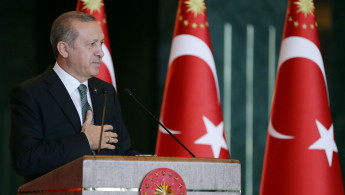What changes under Turkey's planned new constitution?
Turkey's parliament approved a controversial new draft constitution which would expand the powers of the presidency under Recep Tayyip Erdogan, meaning the country will vote on changing the constitution later this year.
While critics say the move is part of a power grab by Erdogan for a one-man rule, supporters say it formalises a de facto situation and is needed for an efficient government.
But what would change under the proposed 18-article draft constitution for the nation of 79 million?
More powers for ErdoganUnder the new constitution, the president would have strengthened executive powers to directly appoint top public officials including ministers.
The president would also be able to assign one or several vice presidents. The office and position of prime minister, currently held by Binali Yildirim, would be scrapped.
The current constitution, adopted in 1982 in the wake of the 1980 military coup, guarantees independence of the courts from an "organ, authority and office".
But the draft constitution would allow the president to directly intervene in the judiciary, which Erdogan has accused of being influenced by supporters of his ally-turned-foe Fethullah Gulen who is blamed for the July 15 failed coup.
The president and the parliament would together be able to choose four members of the Supreme Board of Judges and Prosecutors (HSYK), a key judicial council that appoints and removes personnel in the judiciary. The parliament would choose seven members on its own.
Military courts, which have convicted officers and even sentenced former prime minister Adnan Menderes to death following a 1960 coup, would in the future not be allowed.
However the draft said that on issues clearly regulated by laws, the president could not introduce decrees.
State of emergency
Under the draft constitution, a state of emergency would be imposed in the event of an "uprising against the homeland" or "acts of violence which put the nation in... danger of being divided", the official news agency Anadolu said.
The president would decide whether or not impose a state of emergency and then present it to the parliament.
The parliament, when it deems it to be necessary, can shorten, lengthen or lift the state of emergency, the agency added.
Initially the emergency would last six months, 12 weeks longer than the current emergency can be introduced and then it can be extended by the parliament after a presidential request for four months each time.
More members of parliament
The number of members of the Turkish parliament would rise from 550 to 600. The minimum age limit for MPs would also be lowered from 25 to 18.
Election changes
Legislative elections would take place once every five years - instead of four - and on the same day as the presidential elections.
The parliament would still have power to enact, modify and remove legislation. It would retain supervisory powers to write enquiries with help from an investigative authority.
It would also be able to oversee the president's performance but the latter would have authority to issue a presidential decree on all matters related to his executive powers.
If the president were accused or suspected of a crime, then parliament could request an investigation.
Partisan president
The president will have to be a Turkish citizen at least 40 years old, and can be a member of a political party. Currently the president must be impartial and without party favour.
Longer Erdogan term?
The draft constitution states that the next presidential and parliamentary elections are to be held simultaneously on November 3, 2019.
The president would have a five-year term with a maximum of two mandates.
Erdogan was elected president in August 2014 after more than a decade as prime minister, in the first ever direct elections for a Turkish head of state.
But there have been suggestions that the clock on his presidency will start from zero from 2019 as the new constitution creates a new presidential role.
If this is so, Erdogan would be able to stay in power until 2029, not 2024. The president has yet to make explicitly clear whether this is the case.


![President Pezeshkian has denounced Israel's attacks on Lebanon [Getty]](/sites/default/files/styles/image_684x385/public/2173482924.jpeg?h=a5f2f23a&itok=q3evVtko)



 Follow the Middle East's top stories in English at The New Arab on Google News
Follow the Middle East's top stories in English at The New Arab on Google News


